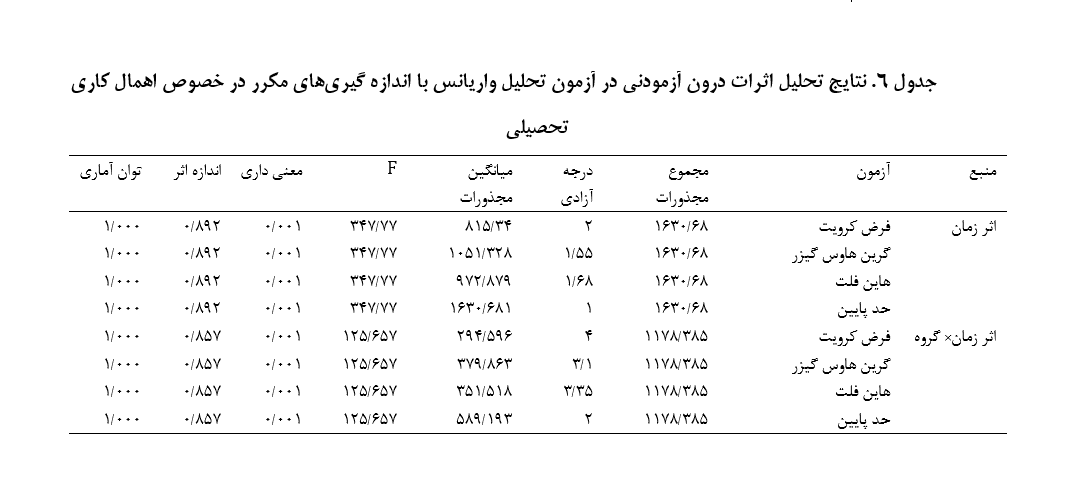Comparison of the Effectiveness of Cognitive Engagement Training and Metacognitive Strategy Training on Academic Procrastination Among Female Students at Farhangian University
Keywords:
Cognitive engagement, metacognition, strategic training, academic procrastinationAbstract
This study examines the differences in the effectiveness of a cognitive engagement training package versus a metacognitive strategy training package on academic procrastination among female students at Farhangian University. The research employed a quasi-experimental design with a pretest-posttest control group and a two-month follow-up period. The statistical population included all female students at Farhangian University in Kazeroon during the first semester of the 2019-2020 academic year, totaling 250 individuals. To compare the cognitive engagement and metacognitive strategy training packages, a purposive sampling method was used. Initially, the Academic Procrastination Questionnaire (Savari, 2011) was administered to 250 female students at Farhangian University in Kazeroon. From those scoring up to 48 on the academic procrastination scale, 45 individuals were purposively selected and randomly assigned to two experimental groups (15 in the cognitive engagement group and 15 in the metacognitive strategy group) and a control group (15 participants). In the posttest and follow-up stages, a significant difference was observed between the mean scores of academic procrastination in the control group compared to the metacognitive strategy training group (p < .001) and the cognitive engagement training group (p < .01). The impact of metacognitive training on reducing academic procrastination in the posttest and follow-up stages was 33.5% and 28.1%, respectively. The cognitive engagement training package reduced academic procrastination by 69.9% in the posttest and 66% in the follow-up stage. While both cognitive engagement and metacognitive training methods significantly reduced academic procrastination in the posttest phase, an increase in procrastination was observed during the follow-up phase in both groups. Comparing the two methods, cognitive engagement training was more effective than metacognitive strategy training in both the posttest and follow-up stages.
Downloads
References
Joojam P, Safarpour-Dehkordi S. The Effect of Cognitive and Metacognitive Strategies on Self-Concept and
Academic Procrastination in Middle School Students. Excellence in Education Quarterly. 2024;3(2):6-10.
Pintrich P. The role of motivation in promoting and sustaining self-regulated learning. International Journal of
Educational Research. 2003;31:450-70. doi: 10.1016/S0883-0355(99)00015-4.
Jabbari Daneshvar A, Rezayi A. The Role of Academic Identity and Goal Orientation in Predicting Cognitive
Engagement of Students. Advances in Behavioral Sciences. 2023;7(55):478-91.
Torabi K, Nikookar A. The Role of Academic Engagement Dimensions and Responsibility in Academic Self-Efficacy
of 8th Grade Female Students. School Counseling. 2021;1(2):1-16.
Najarian Z, Vahedi S. The Relationship of Perseverance, Psychological Hardiness, and Resilience With Academic
Engagement in Students: A Path Analysis Model. Educational Psychology Quarterly. 2023;18(66):169-92.
Karimi SB, Mehrparvar M. The Effectiveness of Training Cognitive and Metacognitive Learning Strategies on
Reflective Thinking and Self-Directed Learning in Students. Learner-Centered Curriculum and Education Journal. 2021;1(4).
Saif AA. New Educational Psychology. Tehran: Douran Publishing; 2016.
Lotf Abadi H. Educational Psychology. Tehran: SAMT Publishing; 2005.
Faraji S. Explaining the Relationship Between Cognitive and Metacognitive Strategies With Cognitive Engagement
in High School Students in Ilam. Ilam: Bakhtar Institute of Higher Education; 2021.
Pour Abdol S, Sobhi Gharamaki N, Abbasi M. Comparison of Academic Procrastination and Academic Vitality in
Students With and Without Specific Learning Disabilities. Learning Disabilities Journal. 2015;3(4):22-38.
Sheikholeslami A. The Effectiveness of Training Cognitive and Metacognitive Learning Strategies on Academic
Procrastination in Students With Low Academic Achievement. School Psychology Journal. 2017;6(3):65-84.
Mesrabadi J, Erfani Abab E. Meta-analysis of the relationship between learning strategies and academic achievement.
Biquarterly Journal of Cognitive Strategies in Learning. 2014;2(2):97-118.
Babaei S, editor The Relationship Between Academic Procrastination and Personality Traits of Students. First
National Conference on Sustainable Development in Educational and Psychological Sciences; 2017.
Amir Ardejani N. The Effect of Training Metacognitive Strategies on Locus of Control and Flow Experience in
Female High School Students. Rooyesh Psychology Journal. 2023;11(7):189-98.
Ghadampour E, Biranvand K. The Effect of Cognitive and Metacognitive Learning Strategies Training on Academic
Procrastination and Self-Efficacy of Students. Cognitive Sciences Quarterly. 2019;21(3):31-41. doi: 10.30699/icss.21.3.31.
Taghaviania A. The Effect of Metacognitive Strategy Training on Help-Seeking and Academic Procrastination in
Conditional Students. Cognitive Strategies in Learning Biannual. 2018;6(11):193-214.
Nemat Zadeh Souteh G, Ghanadzadegan, Emadian SA. Comparison of the Effectiveness of Cognitive Behavioral
Training Based on Procrastination and Multidimensional Motivational Cognitive Intervention on Academic Procrastination in
High School Students With Addicted Parents. Social Psychology Research. 2024;13(49):77-90.
Jafari L, Bigdeli K. The Relationship Between Self-Regulation (Cognitive and Metacognitive) and Academic
Procrastination With Adaptation to Goals in Islamic Azad University Students. Analytical Cognitive Psychology Quarterly.
;13(51):15-32.
Zhou M, Lam KKL, Zhang Y. Metacognition and academic procrastination: A meta-analytical examination. Journal
of Rational-Emotive & Cognitive-Behavior Therapy. 2022;40(2):334-68. doi: 10.1007/s10942-021-00415-1.

Downloads
Published
Submitted
Revised
Accepted
Issue
Section
License
Copyright (c) 2024 Journal of Study and Innovation in Education and Development

This work is licensed under a Creative Commons Attribution-NonCommercial 4.0 International License.










